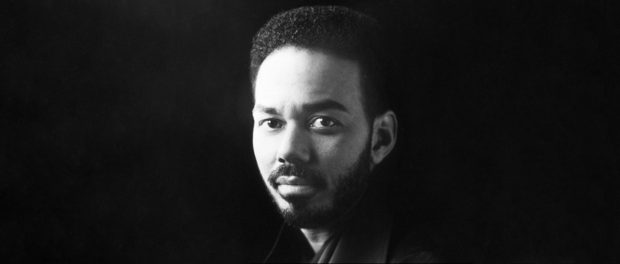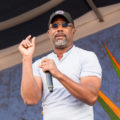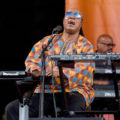Remembering James Ingram in conversation on Quincy, Sinatra, MJ, Kanye and his final album “Stand”

Prior to his passing at 66-years-old, James Ingram kept a relatively low profile outside of occasional concerts and releasing “Stand (In The Light),” which turned out to be his final studio album. Nonetheless the R&B, pop and gospel singer left behind a tremendous musical footprint, from his earliest days as a superstar sideman, getting discovered by producer extraordinaire Quincy Jones, writing for Michael Jackson, rubbing elbows with Frank Sinatra and scoring a sample from Kanye West. That’s not even taking into account mega duets such as “Yah Mo B There” with Michael McDonald, “Somewhere Out There” with Linda Ronstadt and “Baby Come To Me” with Patti Austin, his own “Just Once,” “I Don’t Have The Heart” or “One Hundred Ways,” plus appearing on USA For Africa’s globally gargantuan “We Are The World.” Go back in time to hear about the highlights when the multiple Grammy winner phoned in from his California home surrounding the “Stand” sessions.
What’s it like for you changing gears between soul to gospel throughout “Stand”?
Ingram: There is no gear change. I mean the words and lyrics guide it over here or there, but I’m not caught up in none of that. I grew up in gospel music and sing soul. Then you have a gospel artist like Kirk Franklin sampling Funkadelic and it becomes a huge hit. Music is music, you know what I’m saying? Also, I can’t read music. It’s a gift to me from God, so I don’t put any labels on it when I make it.
 You mention growing up on gospel music. Who’s your biggest influence?
You mention growing up on gospel music. Who’s your biggest influence?
Ingram: One of the strongest to me in terms of the music and grooves that was really close to my heart was Andraé Crouch. Just the way he was coming at it with the music made me feel like part of it, as opposed to a lot of the old traditional sounds.
What inspired the title track?
Ingram: We wrote “Stand (In The Light)” after Hurricane Katrina, looking to make a record that could help in some way. “Stand” refers to standing in the light of God, despite all the devastation.
You’ve always said that family comes first, which is sometimes a struggle for entertainers. What motivated you towards that stance?
Ingram: It’s easy. Before my father joined the church, he had a sixth grade education and was an alcoholic. His father changed a quarter and gave him a nickel and only saw him one time his whole life. I never knew that part of him. All I know is my father had taken us to church, so I never knew he had gotten that low in life until my mother told me when I was 15 or 16 years old. There ain’t no way in the world I would ever [have that kind of negative impact] on my kids!
When I did my first [solo] tour [after backing Quincy Jones], it was in 1986 with Patti Labelle. We were on the road for six months. My family would come out on the road with me now and then, and then I would come back when I could. I made a lot of money and said to myself that I would never do that again in my life. It was a great experience because I learned a lot as an artist, but because of family, I have never done a tour like that and never will. I don’t care how broke I am!
How did you hook up with Quincy Jones?
Ingram: I was singing demos with ATV Music Publishing, which housed a lot of writers in the same building as Motown. They had a studio where writers would go and lay tracks down to submit song to different producers. One of the songs was “Just Once,” which I finished for $50 and a copy of the demo. Little did I know that ATV got it out to different producers, including Quincy Jones, who asked, “Who’s the singer?” [The day he called], I was co-writing with Howard Hewitt from Shalamar, and I told my wife “I don’t want to talk to nobody unless it’s an emergency!” So a call came and she said “James you better come to the phone. It’s Quincy Jones!” And I was like, “Quit playing around!” Sure enough it was, and he was asking if I had signed with anybody. I couldn’t believe he wanted me as a singer, not just a session player.
Well you two obviously hit it off because not only was the song a smash, but if I’m not mistaken, it was the first time a ballad was ever used to open the Grammy Awards.
Ingram: That was my first time singing in front of anybody! Quincy talked [NARAS] into opening the Grammys with “Just Once” rather than the big production number with dancers. I was just standing up there scared and trembling because I had never done that before. People started clapping, and I warmed up and got through it, but after that I had nightmares about not being able to live up to being a singer after getting thrown into that. It’s not like God prepared me to do that!
 At the same show, “One Hundred Ways” was up for a Grammy. Rick James had just finished performing, and then James Brown and Tina Turner presented the R&B award. I heard them say “James,” and I started clapping because I assumed Rick James had won, but then my wife started nudging me. I was looking at James Brown and Tina Turner and they were calling me up! I didn’t believe it at first, and the first words out of my mouth were, “Thank you God for so many blessings; which was exactly what that was!
At the same show, “One Hundred Ways” was up for a Grammy. Rick James had just finished performing, and then James Brown and Tina Turner presented the R&B award. I heard them say “James,” and I started clapping because I assumed Rick James had won, but then my wife started nudging me. I was looking at James Brown and Tina Turner and they were calling me up! I didn’t believe it at first, and the first words out of my mouth were, “Thank you God for so many blessings; which was exactly what that was!
What were your feelings being a part of “We Are The World”?
Ingram: I was like, “God, what did I do to get here? I’m in heaven!” It’s still like a dream, even to this day. The thing about Quincy is he incorporated me as both a songwriter and a singer for all kinds of special projects. He just took me with him.
How about working with Michael Jackson and writing for “Thriller,” the biggest selling album of all time?
Ingram: The title “Pretty Young Thing” came from Peggy Lipton [Quincy Jones’ wife at the time] coming home with some women’s lingerie that was called “Pretty Young Thing,” so Quincy thought that would be a great title. He said “Pretty young thing/tender lovin’ care” and he put a lot of songwriters on the same project [to come up with the rest of the lyrics] with that title. I had my meeting with Quincy at 7 o’clock and somebody else was there and had just played their thing for Quincy. All I had was “Where did you come from baby/ won’t you take me there” and it was on right away! Quincy said “We’re cutting this tomorrow” right in front of the other dude. It either hits him or it doesn’t! So we went in and cut it, and once we cut it, I went in and sang all the backgrounds that I had on it. I’m singing the background on the record that Michael’s singing on.
But let me tell you something about when Michael came into sing it. I’ve been in studios with Marvin Gaye and Ray Charles. I’ve been in studios with a lot of people singing and stuff, but Michael Jackson was in there singing “Pretty Young Thing” and dancing at the same time! Now me, I’m trying to hold every bit of my breath at that microphone. I couldn’t be dancing if you had a gun to my head! Some may rock a little bit or move their head, but they’re not going to be dancing, right? Michael was dancing and he came out and said “James, is that all right? “Michael you can sing anything or any way you want to man. You killed it!”
What’s your reaction to Kanye West’s sampling of “P.Y.T.”?
Ingram: What I don’t understand about sampling with new music these days is that he used such a little part. I don’t know why I got paid so well for it! I mean, Kanye West is talented in terms of doing what he’s doing, but there really wasn’t enough in there of my work for me to get paid. If it was up to me, I wouldn’t have charged him.
 What were your favorite duets over the years?
What were your favorite duets over the years?
Ingram: Those were some of greatest parts of my life. Once again, I never knew those would happen. When I came out to L.A. and I was playing on these guys’ records as a musician, I really thought I made it not knowing God had more in store for me! So I was beside myself, there ain’t no doubt about that. I loved every bit of it!
Did you meet Frank Sinatra when Quincy was working with him?
Ingram: Quincy took me, Michael Jackson and my wife when he was performing out at the amphitheater. Frank was doing his thing backstage and he talked to Quincy and he talked to Michael and then he said “I know you kid. You got a nice voice” because he recorded “How Do You Keep The Music Playing?” When we left there, Quincy told me and Michael, “Look, ya’ll can come in this business and leave or you can do like this dude. He’s in his ‘70s and he’s going to go over there and get a million dollars just to do one show. It ain’t just the money though.” You know what else he told us? Even though we had hit records, Quincy said “You need to study his phasing, not that you need to sing like him.” You know why? Cause he’s phrased like a musician. Frank Sinatra’s phrasing is like a trumpet or a jazz instrument.
How do you respond when people refer to you as a legend?
Ingram: I’ve never thought of myself as an icon and never will. The thing that separates me spiritually from a lot of this [attention] is that I’ve known the light of God [from the beginning of my career]. By me having the light of God in me, the limelight is nothing more than lime to me; a light color of green to help me take care of my family…None of that phased me and I never see myself as icon. People tell me I’m a legend and that don’t mean nothing because I ain’t falling for it. I’m not trying to act holy. I just know what’s most important.
For additional information on James Ingram, visit Facebook.com/JamesIngramsMusic.








